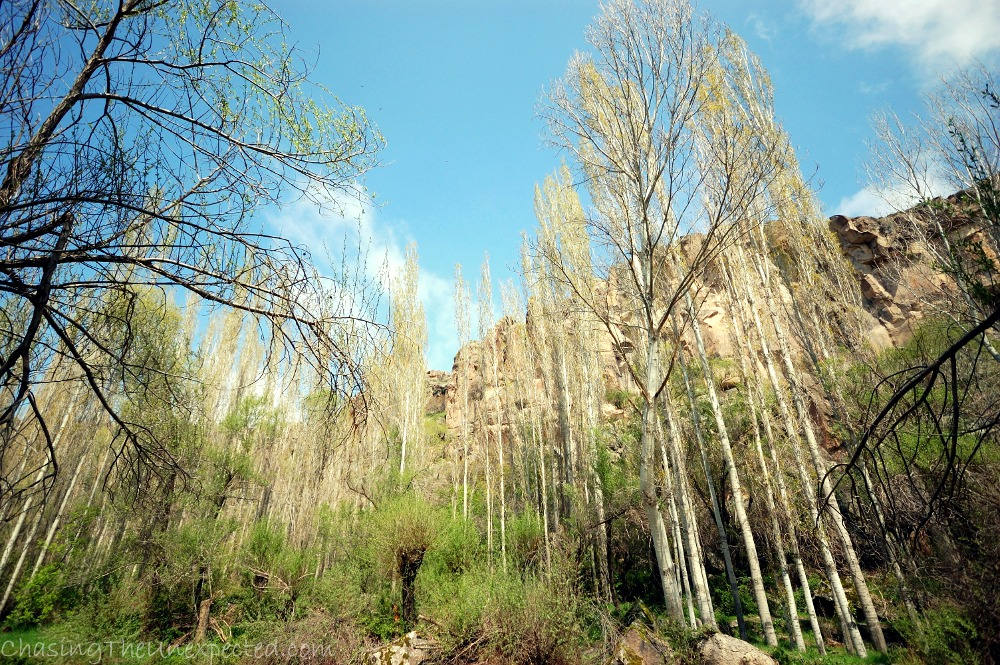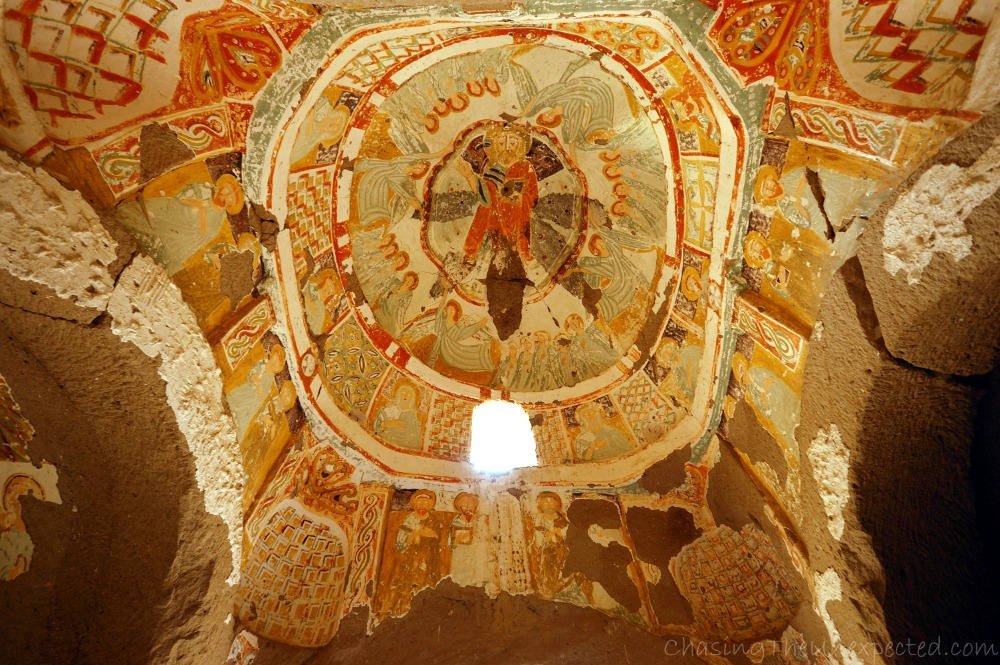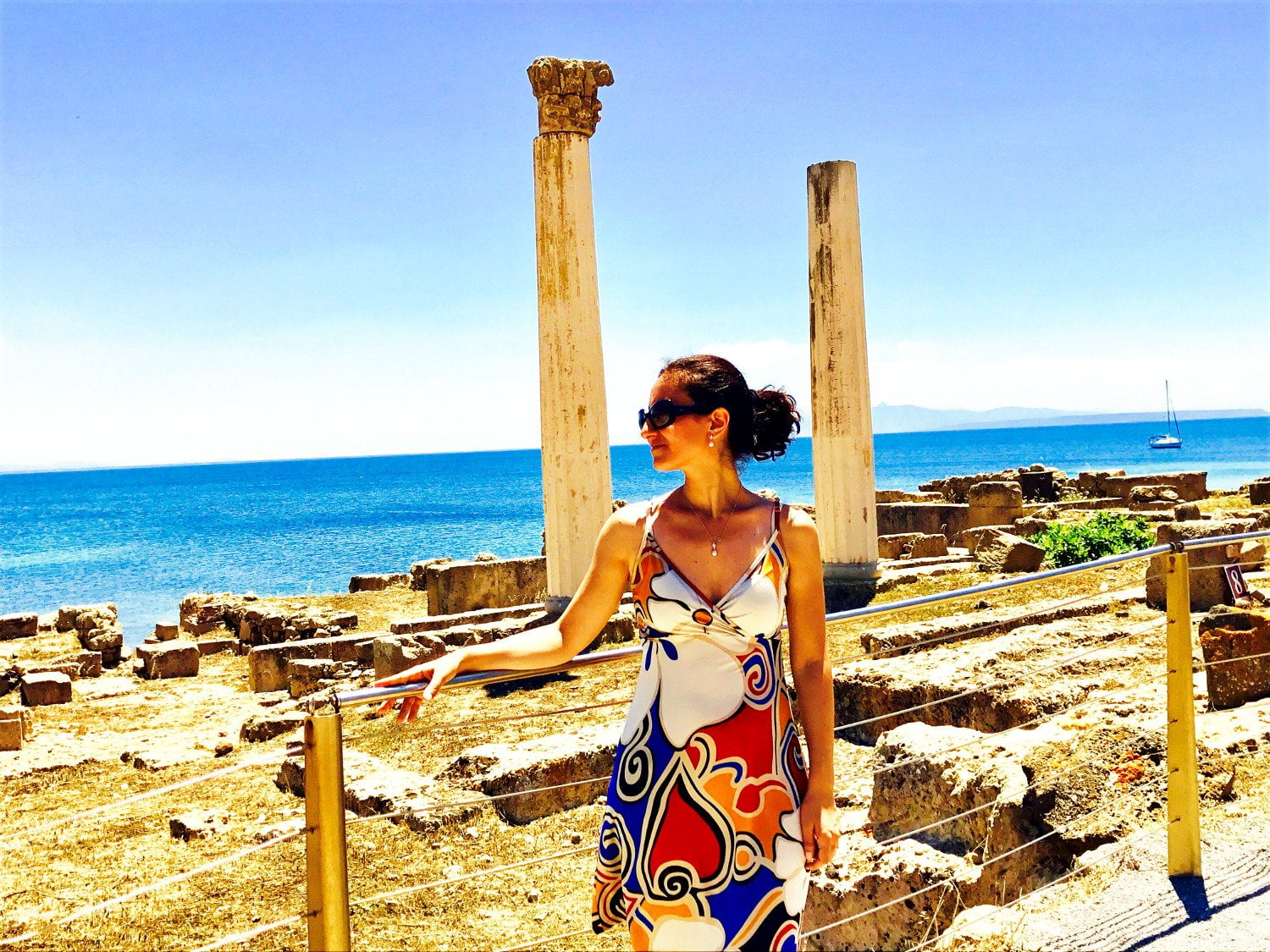One of the first places we visited in Cappadocia was the Ihlara Valley. Set between Mount Hasan and Mount Melendiz, the Ihlara Valley is a stunning gorge of some 14 km dug by the Melendiz River in the span of thousands of years. During our trekking tour, we soaked in nature and explored many of the local historical sites.

Ihlara Valley Hike in Cappadocia – Full Guide
Often included in the best Turkey holiday packages, the Ihlara Valley, as our guide explained to us, stems from the lovely collaboration of volcanic activities and tectonic movements that together have created the natural wonders we can gape at today.
When the basalt and andesite lava from Hasandagi cooled down, cracks, subsidence and structural failure gave space to water streams. Among these was the Melendiz creek, ancient Potamus Kapadokus, which has eroded the bottom of the valley creating what we see now.

Trek in nature
One of the main reasons travellers book their hike in the Ihlara Valley is to discover and admire the local nature. We reached the rocky greenish route of the Ihlara gorge going down a ladder, and there our adventure started. The hike is not very difficult, but it can be tiring at times.

You can take breaks to rest, but whether you are going on a guided tour or by yourself, you don’t want to stay in the gorge until dark when you can’t properly see the paths. Even though you are not going to hike for the whole 14 kilometers, the tour does last quite a few hours. So if you feel you are out of training, enquire with the tour leader before embarking on the journey.
Book your tour of the Ihlara Valley

See Ihlara Valley’s churches and monasteries

For 14 km nonetheless, the Ihlara Valley hosts hundreds, if not thousands, of churches and monasteries, including beautiful Selime, situated at its very edge, where we ended our tour. All along our walk, starting with the 400-something steps to go down the valley, we were confronted by natural beauty and man-made buildings.

On the 100-150-meter-high rock formations, you will have the chance to see countless churches embellished by beautiful frescoes ruined only by the iconoclast wave and Muslim invasions. Along the valley are also graves and holy places of the Christians inhabiting the region and hiding there to escape the several invasions that hit Cappadocia in the centuries.

The churches in the Ihlara Valley are all early-Christian style, early Byzantine, the Eastern Roman Empire that started around the end of the fourth century when it separated itself from the Western Roman Empire that had Rome as its capital.
A central nave, simple columns, arches, vaults and domes form these primordial Christian worship places. We visited some of them, and the most remarkable within the gorge of the Ihlara Valley was Sümbüllü (Jacinth) Church, a monastery where we could see both the sacred area and where the bishop and monks lived.
Belisirma village
Located on the banks of the Melendiz river, Belisirma is a small village built on the slopes of the Ihlara Valley. It’s part of most trekking routes and very likely you are going to stop here for lunch if you book a tour to the Ihlara Valley.
Book your tour to the Ihlara Valley
Visit Selime monastery
Leaving the valley, we stopped at Selime monastery, entirely carved out of tuff hills, with different areas being employed for different purposes, so apart from the main church, we also visited students’ rooms and refectories.
READ MORE: Fairytale-like Selime monastery in Cappadocia
What to see near the Ihlara Valley
The very first settlements in this area of Central Anatolia appear to be from the Assyrian civilization, becoming next the center of Hittite control in the region, followed by the Phrygians, the Persians, the Romans, the Byzantine Empire, the Seljuk and finally the Ottomans. Some other places to visit after your Ihlara Valley tour.
Derinkuyu underground city
Apart from hosting monks and related monasteries, Cappadocia was also a glorious stop on the Silk Road. On this legendary trading route, cultures, philosophies and goods were exchanged by traders from the Far East on their way to Europe. Some people just went past, and others settled, like the Christians who left Jerusalem in the second century and established their new life in Central Anatolia, around Derinkuyu, a fascinating underground city today.
While the Ihlara Valley, the lovely area of Belisirma and the big rock monastery complex of Selime had predominantly a religious function, scattered around the territory are subterranean dwellings. Our last stop before heading back to Göreme was precisely Derinkuyu, the biggest underground city in the area. At its very entrance, I had the impression of being motioning towards the Underworld. And to some extent, we were an underworld where the region’s former inhabitants had built all needed comforts.
Deep holes were dug in order to ensure air would be channeled down, wells to provide dwellers with water, cisterns, rooms, kitchens, food storage, and even wineries and the unmissable church were built. In a nutshell, the essentials to best reproduce a normal life, as possible as it could be twenty meters beneath the earth’s surface. The soft rock sure allowed easier digging, but the efficient ventilation techniques, air movement channels, safety and security measures, wells and even garbage collection systems never fail to impress the visitors.
Goreme Open-Air Museum
A wide complex of monasteries and cave churches, Goreme Museum is a must if it’s your first time in Cappadocia.
READ MORE: Visiting Goreme Open-Air Museum in Cappadocia

Red Valley and Rose Valley
Some of the most impressive hikes you can do in Cappadocia for sure include the one along the Red Valley and Rose Valley. Having an up-close experience of the tuff chimneys is worth the fatigue of climbing up and down the typical rock formations.
READ MORE: Hiking the Red Valley and Rose Valley in Cappadocia
How to reach the Ihlara Valley
The Ihlara Valley has several entrances. One is from Belisirma village and you can get there by car and one at its beginning at Ihlara village. The most popular is the one we took, going down the stairs. You can rent your own car or motorbike, but if you are not confident in those roads, your best option is to either hire a local driver or book a tour of the Ihlara Valley.
Where to stay near the Ihlara Valley
To easily reach the Ihlara Valley, the best towns to book your Cappadocia hotel are Goreme and Uchisar.
Goreme hotels: Milat Cave Hotel, Cave Life Hotel, Caftan Cave Suites.
Uchisar hotels: Hermes Cave Hotel, Taskonaklar, Museum Hotel.
WANT TO READ IT LATER? PIN IT TO YOUR BOARD!



Oh là là, c’est beau!
Superbe!
Che paesaggi strani, mi ricordano un pò la Barbagia!
Sicuramente da vedere!
Anche a me ha ricordato la Barbagia, e le rocce scavate sembrano proprio domus de janas!
I have been to Cappadocia three times and I must say it doesnt get old. So awesome. I highly recommend getting up at 5:30 am and going to the area where all the balloons launch from for some great sunrise with balloon photos.
Sadly when we went there were no ballons as weather conditions didn’t allow, the best reason to go back ;)
I secretly have always wanted to stay a few days in a cave. With all the hiking and exploring involved, this place is really looking like a great destination. I especially love the history behind it. You always find the most interesting places.
Many hotels are carved out in those caves, and the atmosphere is truly magical. Make a trip there, Sherry, you won’t regret it ;)
Great tour you had — glad I came along on the virtual tour. :) Cappadocia has been on my list for all of the beautiful scenery I’ve seen, but I don’t think I ever saw the churches carved in the hills. And the frescoes are amazing!
Some frescoes were ruined by time and invasions, but those that survived were really great, given they are so ancient. If you have the occasion by all means go to Cappadocia, it’s a wonderful region!
One word… MASSIVE!
Indded! Cappadocia is overwhelming, and in my opinion this was not even the most stunning landscape, stay tuned for more pics!
I booked the red tour as well and our guide rushed us through the valley. Felt like I ran through it. Seems you were given ample time to appreciate the surroundings
The actual tour gave us plenty of time to enjoy and take photos, the only thing, our guide spoke only in Turkish because the majority of the tourists were Turkish! He only translated very little for us and obviously replied to our questions when we had some.. I think this was a pity as what he said was certainly very interesting.
Breathtaking shots. I love monasteries. One of my favorites so far has been the Rila monastery in Bulgaria, but these shots are impressive. The valley looks like something straight out of a fantasy movie…absolutely amazing. Thanks for sharing!
Thanks, glad you like the pictures. Wonderful places, nor difficult to take nice shots there!
This looks amazing. I’m glad you’re sharing about your cappadocia trip. It’s been my dream to visit there — and anywhere in Turkey — for a long time. Looking forward to reading more!
By all means, make a trip to Cappadocia, you won’t regret it!
Those frescoes are beautiful.
Beautiful and well preserved even though they’ve gone through the iconoclast period and muslim invasion!